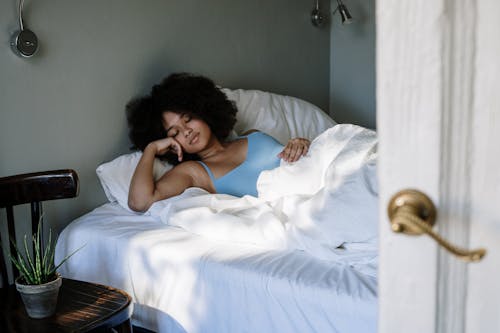Why You Struggle to Sleep on Your Period
Why You Struggle to Sleep on Your
Period
Did you know that your menstrual cycle can impact your sleep quality? It's true! In New Zealand, almost thirty percent of people don't get enough sleep, and your period can contribute to sleep difficulties.
If you find it challenging to sleep during your period or when experiencing PMS, you're not alone. Many individuals search for solutions to improve their sleep and manage PMS-related sleep disruptions. Keep reading to discover some helpful information on this topic.
Pesky PMS Symptoms Are Affecting Your Sleep! Here’s Why
Are you experiencing sleep disruptions due to pesky PMS symptoms? It's important to understand why these symptoms can affect your sleep. During your menstrual cycle, hormone levels, such as estrogen and progesterone, decrease significantly before your period, leading to PMS-related sleep problems.
Various physical symptoms of PMS can disrupt your sleep cycle, making it challenging to fall asleep and stay asleep. These symptoms may include backaches, headaches, stomach cramping, increased sensitivity to sound or light, and bloating. Additionally, PMS can impact your mental health, causing anxiety, depression, or both, which further impede your ability to sleep.
When you don't get enough sleep, it can result in daytime sleepiness, making it harder to be productive at work and enjoy your social life.
For individuals with Premenstrual Dysphoric Disorder (PMDD), the symptoms can be even more severe. In addition to those mentioned above, PMDD symptoms may include vision problems, hot flashes, limb swelling, increased bruising, itchy skin, and urinary issues. If you suspect you may have PMDD, it's advisable to consult a doctor for potential treatment options.
Remember, understanding the impact of PMS on your sleep can help you find effective ways to manage these symptoms and improve your overall sleep quality.
Discover Life-Changing Sleeping Positions
Your sleep position can also provide relief for PMS symptoms and promote better sleep. Experimenting with different sleeping positions can be an effective strategy.
The most beneficial position for cramps or PMS is the fetal position. This posture helps alleviate stress on your abdominal muscles. So, try curling up in a ball and see how it feels. If you find it difficult to sleep in this position, consider using a body pillow or a weighted blanket to enhance comfort and relaxation.
Another recommended sleeping position is the common child's pose. Initially, it might feel a bit awkward, but it can greatly help with various PMS symptoms. Kneel on your bed, lower your head, and extend your arms out. You can use pillows for support. This pose can also provide relief for pre-menstrual headaches.
Additionally, using a pillow to support your knees while you sleep can help alleviate PMS symptoms. Placing a pillow under your knees keeps them straight, promoting proper blood flow and reducing discomfort. Give all three positions a try and determine which one works best for you.
These sleeping positions have the potential to improve blood circulation and relieve PMS-related symptoms, allowing for a more restful sleep experience.
Beautikini Period Underwear: Your Solution for Carefree Sleep
The last thing you want is to interrupt your sleep by getting up to change tampons or pads during the night. It disrupts your sleep cycle and leaves you feeling exhausted.
Fortunately, Beautikini has the perfect solution for you. Our range of period underwear comes in heavy, moderate, and light flow varieties to suit your needs.
Our Period underwear provides outstanding protection, holding up to 8 tampons worth of flow. With this reliable option, you can sleep peacefully every night, knowing you're well protected. If the period underwear isn't your preferred style, we also offer popular options like period boxer briefs, period briefs, and period hipsters, all designed for comfortable sleep.
Exercise Can Make a Difference
In addition, incorporating exercise into your routine can help alleviate PMS-related issues. Try engaging in light cardio or integrating yoga into your daily regimen. These activities promote better blood flow, ultimately reducing your PMS symptoms.
Exploring Traditional Methods for PMS Relief
There are various medications available to alleviate the symptoms you may experience during PMS. Pain relievers can offer great relief, while diuretics can help reduce inflammation that might be causing discomfort.
If you struggle with general sleep disruptions, there are additional strategies to consider. Avoiding screens for at least an hour before bedtime is crucial, as the blue light emitted can disrupt your sleep cycle. Establishing a regular sleep schedule ensures you consistently receive the rest you need.
Wishing You Restful Nights! You'll Thank Us Later
So, if you're facing difficulties sleeping during your period, we hope these strategies will help ease your discomfort. There are plenty of options available to improve your sleep experience.
What are you waiting for? Start exploring our collection of period underwear today and embrace the freedom of carefree sleep. You deserve it!
Editor’s Picks
- $45.00 AUD
-
$0.00 AUD - $45.00 AUD
- Unit price
- / per
-
Black
-
Blue
-
Brown
-
Red
- Blue CuracaoTangerinePaisley Purple
- $45.00 AUD
-
$0.00 AUD - $45.00 AUD
- Unit price
- / per
-
Black
-
Dark Green
-
Moonlit Ocean
- $45.00 AUD
-
$0.00 AUD - $45.00 AUD
- Unit price
- / per
-
Black
-
Purple
-
Maroon
-
Dark Green
- $45.00 AUD
-
$0.00 AUD - $45.00 AUD
- Unit price
- / per
-
Black
-
Dark Blue
-
Bright Red
-
Grayish Brown
- Black LeafOrange RedBarrier ReefDark Green


















































































































Leave a comment
Please note, comments need to be approved before they are published.